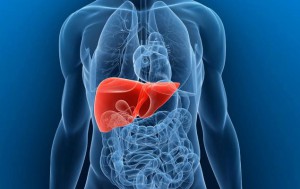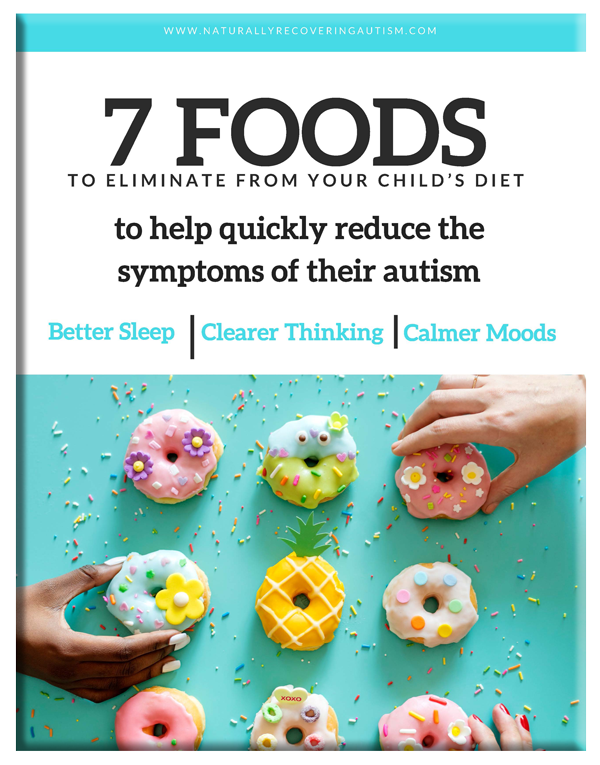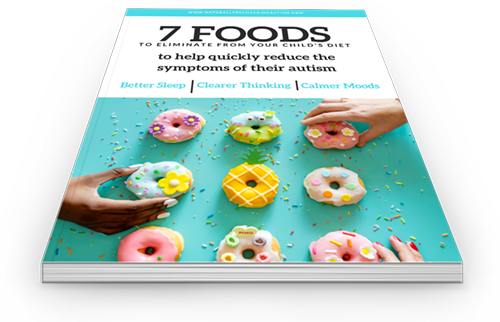The symptoms of autism can be difficult enough to work with. Puberty brings with it many additional challenges for both parents and their children. Beginning around the age of nine, the body triggers hormones to begin puberty. By the age of fourteen, a noticeable change in behavior is happening.
 If your child has been going along peacefully, but suddenly becomes incredibly difficult to deal with, more aggressive, angry, moody, and loses all motivation, it is likely due to hormonal changes affecting his brain.
If your child has been going along peacefully, but suddenly becomes incredibly difficult to deal with, more aggressive, angry, moody, and loses all motivation, it is likely due to hormonal changes affecting his brain.
The Female Hormonal Cycle and How It Affects Behavior
From puberty on, estrogen sets up the cycles in the female brain such as sleep, mood, body temperature, and even breathing. We are more relaxed in the first two weeks of our cycle, and have greater social and verbal abilities. Around day fourteen, progesterone begins affecting the brain’s circuitry and girls become more irritable, have less ability to focus, and slow down. Progesterone plummets during the last few days of the menstrual cycle and females can become stressed, aggressive and even hostile right before their period begins. Low progesterone causes lack of energy.
For females whose bodies have a greater ability to make estrogen and progesterone also have a greater ability to handle stress. This is due to their having more serotonin (the feel good neurochemical). Women with low estrogen and progesterone are more easily stressed, depressed, fearful and angry because they have less serotonin. Stabilizing serotonin levels helps to calm the brain. Testosterone, the male dominant hormone, can also be too high in females, causing overly aggressive behavior.
The Effects of Male Hormones
The male hormone testosterone begins flooding into a boy’s brain at puberty. It is responsible for aggression and territorial behavior. Everything will become boring to him. The teen brain, especially in boys, is difficult to stimulate because his reward center has been almost desensitized. Fortunately, both punishment and reward centers are heightened during this time, so they can be used for motivation. More motivation is needed due to testosterone washing out their reward centers.
Testosterone receptors also change the clock schedule in a pubescent boy’s brain. Teens are not lazy. They actually need at least ten hours of sleep per night. They are becoming programmed to stay up later and sleep until noon. If you are homeschooling, your child has the privilege of getting this extra needed sleep. Traditional school schedules do not allow for our kids to properly adjust to their new internal time clocks. For people on the autism spectrum and those with ADHD, getting up in the morning and going to sleep at night can be very challenging. It is difficult for the brain to slow down. Note that girls are effected by testosterone too.
The Liver’s Effect on Hormones
Most children on the autism spectrum have congested livers and weak detoxification abilities. When the liver is congested, hormones such as estrogen and progesterone cannot be properly broken down and detoxified. This increases
their concentration in the blood and it results in water retention or bloating.  Increased estrogen levels have also been linked to breast cancer. Without proper detoxification these and other toxins accumulate in the blood.
Increased estrogen levels have also been linked to breast cancer. Without proper detoxification these and other toxins accumulate in the blood.
Oral contraception and hormone replacement increase a woman’s chance of developing gallstones because estrogen has a negative effect on the gallbladder’s ability to function properly. Menopausal women are greatly benefited by doing liver cleanses, and by taking supplements to assist the health of the liver.
There are a couple of supplements that can be very helpful for the health of the liver. Liver Detox Pathway Elixir is very helpful for the health of the liver, and assists both Phase I and phase II of liver detoxification.
Mold Biotoxins
Over 29% of the world population has a genetic predisposition to their body not being able to expel the toxins from mold. Water damaged buildings and more contribute to the exposure that then creates a cascade of inflammation in multiple systems of the body. They greatly effect the brain but also the hormonal system.
Heavy Metals
Heavy metals can increase problems with hormones, especially mercury. See my podcast interview with expert Eddie Stone on Natural Intracellular Heavy Metal Detoxification.
Additionally, don’t overeat, keep alcohol intake low, eat enough protein but do not eat excessive amounts of protein or any bad fats, and eat organic, because pesticides and toxins will congest the liver.
Candida Overgrowth
Almost every child on the autism spectrum has candida overgrowth, often picked up from mom in the womb. It is a major contributor to the development of autism. Candida eat sugar in the blood at night, and then the brain doesn’t have enough food (blood sugar feeds the brain). When the brain gets hungry, it signals the adrenals to tell the liver to release more glucose into the blood. The adrenals have now been doing this since birth, so they’ve become worn out and fatigued. They can no longer do this efficiently, so the brain stays hungry. As it needs food, it wakes your child up to try and get some. This is known as candida induced hypoglycemia. An imbalance of adrenal hormones can impair the body’s ability to grow and to recover from illness and injury. This imbalance also disrupts the body’s ability to build and utilize protein, or to perform what is known as protein synthesis.
Hypoglycemia or Low Blood Sugar
Hypoglycemia is a condition that comes from low blood sugar or low glucose levels. Behavioral outbursts, anxiety, and lack of ability to think clearly can be the result of the brain being starved of its energy supply. An imbalance of adrenal hormones can impair the body’s ability to grow and to recover from illness and injury. Keep blood sugar balanced with healthy protein sources. When combined with some good fats they can stabilize blood sugar for longer times. Nuts are a good choice for a snack (but never peanuts).
Brain Development: The light at the end of the tunnel
The brain does not stabilize until the early to mid twenties. For those parents worried that their teen or early twenties son will never “get it together” there is hope, but it does take time. The part of the brain called the pre-frontal cortex (PFC) which is responsible  for organization, planning, and awareness of consequences for his actions does
for organization, planning, and awareness of consequences for his actions does
not fully develop until the age of twenty-five. The military is very aware of this. It is why they like to recruit young males. They know they will take many risks.
The PFC is also responsible for attention. It can be difficult to get the attention of a male teen or get him to do anything at all. They’re not just trying to be difficult. This is also why it is so challenging to get him to do his homework. Boredom comes very quickly. It can be hard for a male teen to be excited about anything. The reward must be great enough override the flood of testosterone and vasopressin literally dulling their senses. Contrarily, they may seem like they don’t care what people think, but they really do. Saving face is everything at this age.
Assisting Sleep
Remove video and computer games at least one hour prior to settling down for  the night, as those activities stimulate the brain. In contrast, an electronic reading device like Amazon’s Kindle has a different light source that does not stimulate the part of the brain that keeps you awake. If your child cannot go to sleep, let them read their Kindle or a printed book.
the night, as those activities stimulate the brain. In contrast, an electronic reading device like Amazon’s Kindle has a different light source that does not stimulate the part of the brain that keeps you awake. If your child cannot go to sleep, let them read their Kindle or a printed book.
Supplements to Assist Behavior
The supplement 5HTP helps to build serotonin (the king of neurochemicals), which assists in the building of melatonin (the king of sleep hormones). 5HTP also assists with balancing estrogen levels, mood, sleep, and appetite. Adults may benefit from 100mg, twice per day, away from food, children half that.
Stress increases the release of cortisol, which fatigues the adrenals. Symptoms are headache, insomnia, fatigue, anxiety, brain fog, and weight gain, especially around the belly. Imbalanced cortisol affects the sleep/wake cycle. The product Drenamin from Standard Process is excellent for adrenal support. Drenamin is a natural glandular supplement. It can be found in some health food stores and is carried by many natural practitioners such as chiropractors.
Low estrogen can cause brain fog and memory lapses. The natural herb gingko biloba is safe and has been used for centuries to assist with brain fog.
You can use Dandelion, 100-200 mg or ½ teaspoon of tincture, to minimize bloating and help the liver eliminate excess hormones.
The amino acid L-tyrosine is beneficial for issues with focus. This supplement is best taken away from food in the morning and early afternoon. Do not take at night as it may keep your child alert and cause difficulty getting to sleep. Watch for signs of hyperactivity with L-tyrosine as it affects dopamine production which some people have too much of, especially if your child has PANS.
Omega 3 Fatty Acids
Taking 1000-2000 mg omega 3 fatty acids per day has been known to reduce inflammation, cortisol demand, and to assist mood and energy.
Learn more about neurotransmitter support and about brain balancing therapies that can be of assistance in my podcast, Autism and Anger.
The Importance of Diet
The surge in hormones makes the teen brain more vulnerable to the effects of chemicals. Monosodium glutamate is in many processed food items, especially chips. It effects hormones and increases episodes of anger and rage. This is true for all ages, but is especially true for those on the autism spectrum and is heightened during puberty. Take care to feed your child healthy foods without dangerous food dyes, chemicals, and bad fats. Raspberries and raspberry teas help to balance hormone levels as well.
Hormone levels can be tested by health care practitioners. Ask yours if it would be helpful for your child.
Quickly Reduce Your Child’s Symptoms
of Autism by Eliminating 7 Specific Foods that Most People Consume Daily!
The first crucial step of autism recovery is to begin restoring health to the gut and the immune system.
The health of the gut is directly linked to the health of the brain and therefore to the symptoms of autism. In fact, 80% of the immune system comes from the gut so if the gut is not healthy, then the brain can’t thrive, and the immune system is compromised. It’s a vicious cycle, but thankfully, it’s one that we can put an end to by first eliminating harmful foods.
This is for informational purposes only and is not meant to diagnose or treat. Every child’s level of recovery is different. No two people are the same. It is never implied that all children will have the same outcome. Results are all based on individual biology and the work that is done. This process takes time and various steps, effort and resources need to be weighed. Our programs are intended to help you become more knowledgeable and guide you to help bring your child a better quality of life, whatever that may be. We want to help by giving great content, direction and strategies that move you forward. Nothing on this page or any of our websites is a promise or guarantee of results or future outcomes. The results on this page and any of our websites are not typical or promised. In fact, there will be people who purchase this and other programs and never put the work into implementing the strategies taught and therefore will achieve little to no results. Our more detailed earnings disclaimer, privacy policy, and terms and conditions for this program and website can be accessed via the links below. We hold ourselves (and you) to a high standard of integrity. We are cheering you on every step of the way.












Thank you , I’ve been going crazy, didn’t know what to do with my son. He having severe tantrum lately, very aggressive.
Yes, I remember it well. Work with balancing his gut, diet, and brain. All of these supplements are available on this website also on the healthy home/products page.
In health,
Karen
My autistic son will not stop looking at boobs and other inappropriate stuff we take all he’s electronics away but it doesn’t seem to help he also has an inpulse problem he just tired 14 my husband and I just don’t know what else to do please help
Hi Donna,
Children on the autism spectrum often have impulse issues and trouble controlling them. He is not necessarily “being bad” in any way, he literally cannot control himself. This is why punishment like taking away electronics does not always work. I had the same issues with my own son. He is most likely very toxic and this can make impulsivity worse. Candida/yeast problems really accelerate this. He needs to have his biology addressed in order to assist his issues. My autismmomsmentor.com program is a step by step video program that can lead you through the entire process. It is truly the best way I can help you thoroughly, and this is why I developed it. It is for parents like you. My book also has a lot of information for you on all of this and what else you can do for impulsive issues in the chapter on brain support.
looking for natural ways to reduce testosterone in our son to help with aggression
Puberty and testosterone are much worse if there is mercury in the body. This is very common for children with autism. I suggest the zeolites I use (find this here on the healthy products page). To be sure you have covered all of the stages of detoxification and recovery please see my free workshop at https://naturallyrecoveringautism.com/freeworkshop, or you can learn about my complete step-by-step program here on the home page of naturallyrecoveringautism.com.
My son is extremely slow in everything he does from homework to getting ready to go anywhere. He started these behaviors about a year ago. He is now 14. Nothing seems to get him going any faster. It’s very stressful for him and the family! What can we do?
Yes, puberty can bring an increase in behaviors due to higher testosterone. Heavy metal detoxification with zeolites is important( see my podcast interview on intracellular detox). There is much more to do too. Please consider my online step by step mentor program where I can walk you through each necessary step in order. Learn about it and sign up at, naturallyrecoveringautism.com.
Hi Karen, my daughter is 12. She has had her period for 2 years. She becomes aggressive and moody more so at school around 10 days before her period is due. The school nurse suggested giving her the progesterone only pill to help calm her down. I feel uncomfortable about it. Can you please suggest alternative natural remedies that might help her (she is gluten intolerant).
Many thanks
The liver is commonly congested with hormonal imbalance. she may also have the mold biotoxin issue which causes imbalance in hormones too. See the “mold” post and podcast interview her for more.
Hi I have 8 year old girl with autism and I have really problem with her poop. It seems like she is constipated because she always has small amount and is not solid.
I want to toilet training her.